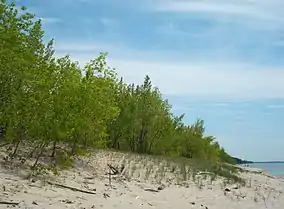Sandy Pond Beach Unique Area
Sandy Pond Beach Unique Area is a 76-acre (31 ha) New York State conservation area located within the eastern Lake Ontario dunes. It lies at the north end of a spit of land dividing North Sandy Pond from Lake Ontario, and is about two miles (3.2 km) north of the developed portion of Sandy Island Beach State Park.[2] There is no road access to the area, which can be most easily reached by boat. For this reason, local residents have long referred to the beach as "Boaters' Beach". It has been managed as part of Sandy Island Beach State Park since 2011.
| Sandy Pond Beach Unique Area | |
|---|---|
IUCN category Ib (wilderness area) | |
 South-facing view of the dunes along the Lake Ontario shore at Sandy Pond Beach in spring 2009. | |
 Sandy Pond Beach Unique Area Location of Sandy Pond Beach | |
| Location | Oswego County, New York, USA |
| Nearest city | Oswego, New York |
| Coordinates | 43°39′36″N 76°11′46″W |
| Area | 76 acres (31 ha) |
| Established | 1994 |
| Visitors | 18,874[1] (in 2009) |
| Governing body |
|

History
The area was purchased by The Nature Conservancy in 1994 from two private owners who were concerned about preservation of the land; the purchase price was about $300,000.[3] The new conservation area was named the Sandy Pond Beach Natural Area. The purchase was followed by a restoration effort involving beachgrass plantings and construction of boardwalks to prevent damage to the beachgrass by foot traffic.[4] The Nature Conservancy properties were purchased by New York State to create the Unique Area, which was managed by the New York State Department of Environmental Conservation as part of the New York State Forest system.[5]
In 2011, administration and ownership of Sandy Pond Beach Unique Area was transferred to the New York State Office of Parks, Recreation and Historic Preservation to be incorporated into nearby Sandy Island Beach State Park.[6][7]
Habitat and ecological value
There is a bird sanctuary on the northernmost tip of this area that hosts large numbers of shorebirds during migration; the Unique Area is part of the Eastern Lake Ontario Marshes Bird Conservation Area that also includes Deer Creek Marsh, Lakeview, and Black Pond Wildlife Management Areas.[8] Visitors and pets are not allowed in the bird sanctuary.
The Unique Area was designated as part of the "Eastern Lake Ontario Barrier Beach and Wetland Complex" New York Natural Heritage Area in 2007.[9]
References
- Kuehn, Diane; Habig, Rachel (January 2010). "Monitoring Recreational Use in the Eastern Lake Ontario Dune and Wetland Area" (PDF). See Table 4, p. 17.
- "Sandy Pond Beach Unique Area". New York State Department of Environmental Conservation. Archived from the original on 2010-07-26.
- Bielen, Mary; et al. "Providing public access in coastal areas: options for landowners" (PDF). Great Lakes Sea Grant Network. Archived (PDF) from the original on 2010-01-26. Retrieved 2010-01-26.
- Gifford, Aaron (2000-09-21). "Answer is Blowin' in the Wind: Group's planting effort restores dunes at Sandy Pond". The Syracuse Post Standard. p. B-1.
- "Region 7 Recreation Master Plan for State Forests" (PDF). New York State Dept. of Environmental Conservation. February 2006. Archived from the original (PDF) on 2010-01-26.
- "2011 Land Acquisition Report" (PDF). NYS Department of Environmental Conservation. 2011. Retrieved March 23, 2016.
- "ENB - Region 7 Notices 11/24/2010". NYS Department of Environmental Conservation. November 24, 2010. Archived from the original on April 4, 2015. Retrieved March 23, 2016.
- "Eastern Lake Ontario Marshes Bird Conservation Area". New York State Department of Environmental Conservation. Archived from the original on 2007-09-30. Retrieved 2011-03-23.
- "Natural Heritage Area Designation for Eastern Lake Ontario Barrier Beach and Wetland Complex". New York State Department of Environmental Conservation. Archived from the original on 2010-01-26. Retrieved 2010-01-24.
External links
- "Map of Sandy Pond Beach Unique Area" (PDF). New York State Department of Environmental Conservation. Archived from the original (PDF) on 2010-05-28.
- "Sandy Pond". New York Sea Grant Extension. Retrieved 2010-01-29.